Where Have All the Drovers Gone?
Zingerman’s 5th Annual Camp Bacon gets underway in just a couple short weeks. To help you prepare for our annual celebration of all things pork, we’re posting excerpts from the Zingerman’s Guide to Better Bacon.
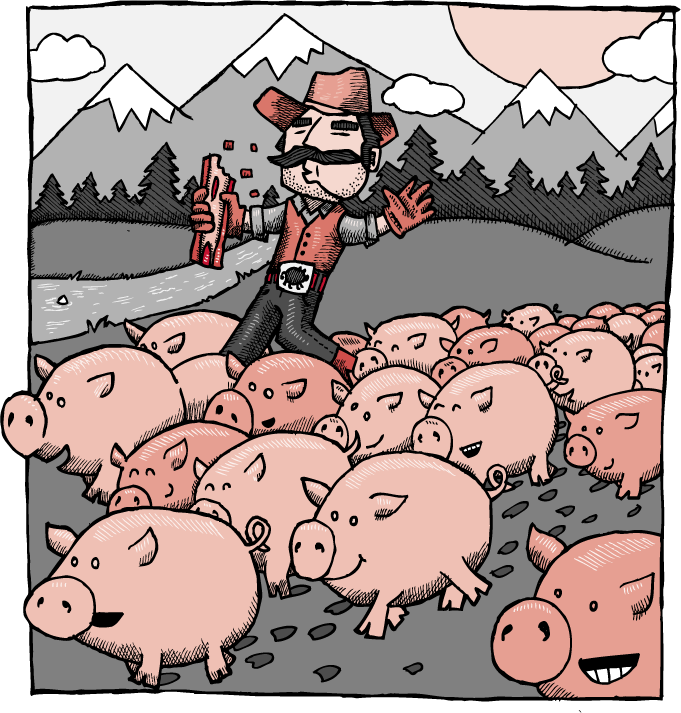
Sorry, I can’t resist the subtitle—the tune slipped into my head while I was out running one day, and I couldn’t get it out. So . . . if Peter, Paul and Mary had lived in the second half of the nineteenth century instead of the twentieth, their big hit could well have been, “Where Have All the Drovers Gone?” While you most certainly won’t see any such openings on Craig’s List, thousands of Americans once worked as drovers, the less glamorous (but probably more important) eighteenth-century piggy equivalent of cowboys like Rowdy Yates and Gil Favor from Rawhide.
In one of those interesting, now all-but-forgotten footnotes of history there was once an entire profession having to do with pork that’s completely lost to us today. It’s a line of work I certainly would never have thought about had I not come across it while doing some reading on nineteenth-century American agriculture. But once you read about drovers, the need for them seems obvious: in order for urban dwellers to get fresh pork to eat, pigs had to be brought from the farms on which they were raised in the rural areas of North America to the cities where they could be slaughtered, sold and served. Before the introduction of the railroads, there was really only one practical way to do so: the hogs had to walk. And since the very valuable pigs weren’t going to be allowed to make the trip un-chaperoned, they were shepherded along their routes by men known as “drovers.” Without the drovers there would have been no American pork industry. Bacon would have been forever limited to on-the-family-farm consumption.
While I’m sure others were at it in less recognizable places, the first formal record of North American drovers that I’ve found concerns William and John Pynchon. The Pynchon brothers started taking livestock from Springfield, Massachusetts, into Boston in 1655. By the end of the seventeenth century theirs had become a well-accepted profession. Farmers driving their own hogs generally had an easier time of it because the animals were comfortable with them. But more often, professional drovers went around the countryside buying a few hogs from each farmer they encountered (most farmers had only four or five pigs, one or two of which were typically to be kept for the family) and gradually gathering them up into a single, large herd. While the boss might ride a horse or wagon, most men walked their way through the hog drives.
Long-distance driving began in 1800 and probably reached its peak by about 1825. A long drive in those days could take three months—the herd made five to ten miles a day if they were doing well. To keep them moving effectively, domesticated pigs were trained to respond to the blowing of a conch shell. En route, drovers risked theft, porcine illness and bad weather: thunderstorms could cause the hogs to panic and stampede. And even under the best of circumstances weight loss was always an issue: pigs often dropped ten to twelve pounds during a drive (I’d guess the drovers lost some weight, as well).
A whole industry grew up around the drives. Drovers had to pay tolls on each hog whenever they traveled on a turnpike (in 1817 the Philadelphia-Pittsburgh route charged a toll of six cents per 20 hogs). A well-positioned stock stand on the turnpike might see a few hundred thousand pigs pass through in a year. The biggest season for driving was late fall, just before slaughtering time. Spring was popular as well, whereas summer heat and winter cold made the long cross-country walks almost impossibly difficult in those seasons. Innkeepers along the route were often paid in lame hogs, which could be turned into provisions for the table. Nor was droving an exclusively American occupation: a great tradition of bacon-making sprang up around Wiltshire, England, in part because the area was a resting point for drovers moving Irish pigs from the port of Bristol up to London.
The demand for drovers—here, in Britain, and probably everywhere else—began to drop off as the railroads came to dominate commercial transportation in the second half of the nineteenth century. Not surprisingly there was a great deal of opposition to the railroads along the driving routes. As you already know, the railroads won out and the drovers disappeared—as did other once-essential and now-unneeded occupations like ice harvesting and stagecoach driving. The only modern reference I’ve ever seen to drovers is the name of a Chicago-based band.
We’ll see you at Camp Bacon 2014!

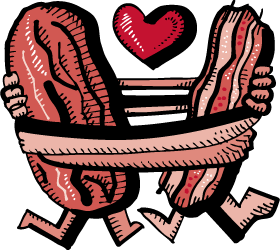 The Bacon Ball at Zingerman’s Roadhouse
The Bacon Ball at Zingerman’s Roadhouse
On Thursday, May 29, 7pm, Camp kicks off with a very special event featuring “the Ham Lady,” Nancy Newsom who will oversee a feast centered on ham, bacon, and all the good things that come from a pig. Nancy’s lauded country ham and aged prosciutto will be the star attractions, and James Beard award-winning chef Alex Young will prepare a menu highlighting Newsom’s delicious meats! This dinner brings in bacon and ham lovers from all over the country!
SORRY, THIS EVENT IS ALREADY FULL.
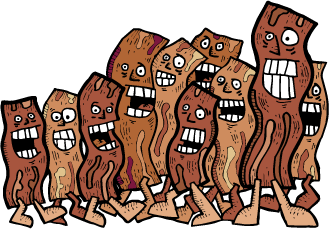 Bakin’ With Bacon at Zingerman’s BAKE!
Bakin’ With Bacon at Zingerman’s BAKE!
On Friday, May 30, instructors at our hands-on teaching bakery at Zingerman’s Bakehouse will share the finer points of baking with everyone’s favorite meat. Guests will use the power of bacon to flavor amazing baked goods including a version of our popular peppered bacon farm bread, bacon cheddar scones, and bacon pecan sandy cookies. Attendees will leave BAKE! with tested recipes, the knowledge to recreate them at home, and everything they made in class.
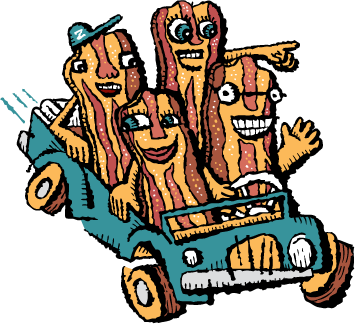 Camp Bacon Main Event at Zingerman’s Cornman Farms
Camp Bacon Main Event at Zingerman’s Cornman Farms
On Saturday, May 31, the Main Eventis changing venues this year and moving out to Cornman Farms in Dexter, MI. The festivities begin at 7:30 am with an amazing breakfast featuring plenty of bacon! We have a full day planned with special guests Bob and Tanya Nueske, Raul Martin, Amy Emberling, Nancy Newsom and more. The Main Event is a fundraiser for the Southern Foodways Alliance, an organization based at the University of Mississippi that documents, studies, and celebrates the diverse food cultures of the changing American South. “It’s my favorite food-based educational non-profit by a mile,” says Ari.
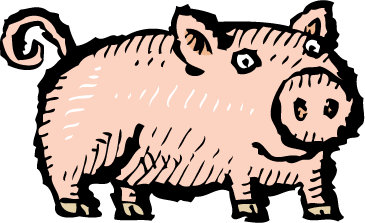 Bacon Street Fair at the Ann Arbor Farmer’s Market
Bacon Street Fair at the Ann Arbor Farmer’s Market
On Sunday, June 1, 11am – 2pm, vendors from Zingerman’s and many other businesses will be on hand sampling and selling their favorite bacon inspired creations and the event will benefit Washtenaw County 4H, an organization near and dear to Zingerman’s Roadhouse managing partner and chef Alex Young. “If you’d told me 10 years ago that I’d add farmer to my list of job titles I would’ve said you’re crazy. But, well, now I’m a farmer and the partnership we’ve developed with 4H has been indispensable for us at Cornman Farms and a big thing for my family, too. I’m really happy to help support them.”
This event is FREE!




Zingerman’s Art for Sale